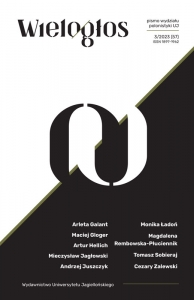Sienkiewicz i Amiel.
O pewnym spotkaniu umysłów i o dwóch nowoczesnych
strategiach intymistycznych
Sienkiewicz and Amiel. About a Meeting of Mind and Two Modern Intimist Strategies
Author(s): Maciej GlogerSubject(s): French Literature, Polish Literature, Theory of Literature, Sociology of Literature
Published by: Wydawnictwo Uniwersytetu Jagiellońskiego
Keywords: Henryk Sienkiewicz – worldview; Henri-Frédéric Amiel – reception; intimate journal; modern conservatism; decadent novel;
Summary/Abstract: The article presents the influence of Henri-Frédéric Amiel’s The Journal Intime pub- lished between 1882–1883 on the works and world-view of the 1905 Polish Nobel Prize winner Henryk Sienkiewicz, and in particular on his novel Without Dogma. The Polish writer must have read Amiel’s journal around early 1890. It seems however, that Amiel’s popularity, amplified by Ernest Renan’s and Paul Bourget’s sketches about him, had already induced a shift in Sienkiewicz’s artistic interests, who in the late 1880s moved from historical epics in favour of the issues of modernity and a first- -person-narrative novel. The comparative analysis investigates the Europe-famous novel Without Dogma (1891) touching upon the crisis of modern European identi- ty. The analysis of the novel, as well as Sienkiewicz’s epistolography, points out to a number of world-view analogies with Amiel, especially in terms of where they saw the roots of the crisis of European culture and humanity in the second half of the 19th century. Both writers emphasized the destructive influence of rationalist self- -analysis, positivist methodology drawing on humanities, and a mechanical perception of the idea of progress. Sienkiewicz also shared Amiel’s political prophetism and ap- proach to revolutionary movements, characteristic for representatives of modern Euro- pean conservatism professed by Edmund Burke and Alexis de Tocqueville.
Journal: Wielogłos
- Issue Year: 2023
- Issue No: 57
- Page Range: 67-91
- Page Count: 25
- Language: Polish

